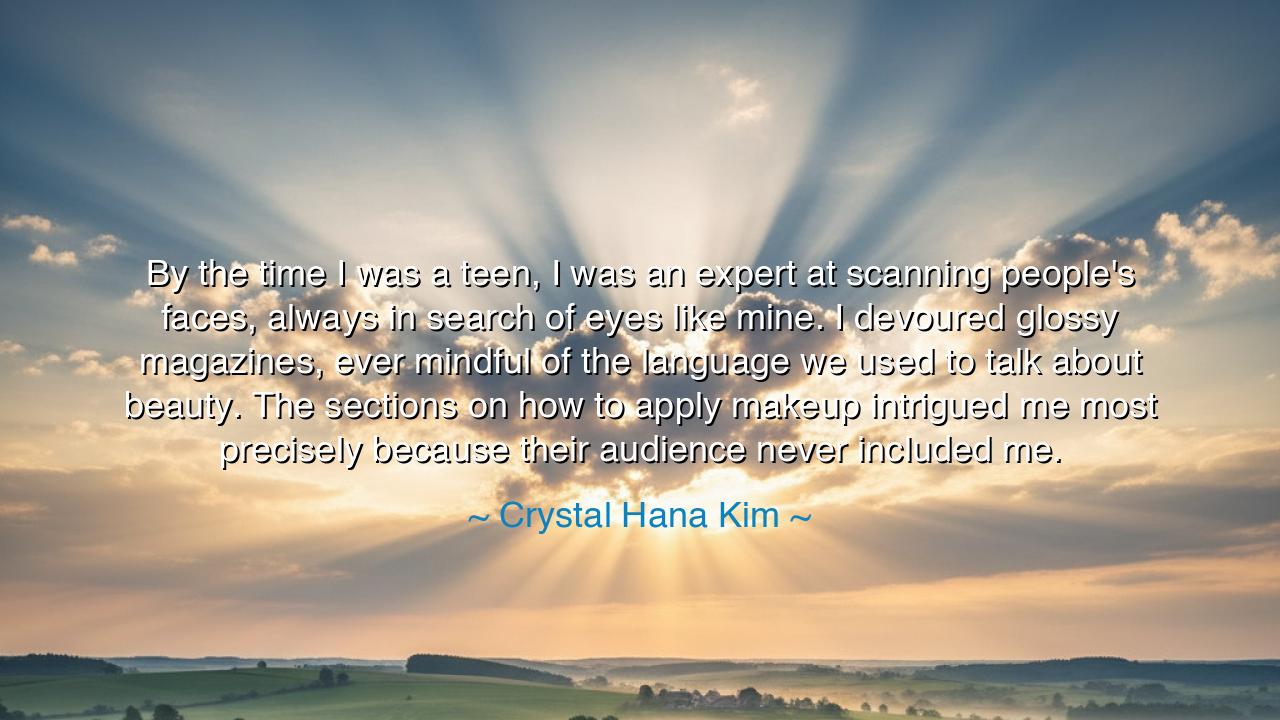
By the time I was a teen, I was an expert at scanning people's
By the time I was a teen, I was an expert at scanning people's faces, always in search of eyes like mine. I devoured glossy magazines, ever mindful of the language we used to talk about beauty. The sections on how to apply makeup intrigued me most precisely because their audience never included me.






When Crystal Hana Kim confessed, “By the time I was a teen, I was an expert at scanning people’s faces, always in search of eyes like mine. I devoured glossy magazines, ever mindful of the language we used to talk about beauty. The sections on how to apply makeup intrigued me most precisely because their audience never included me,” she laid bare a wound carried by many who grow up unseen. Her words reveal the ancient human hunger for reflection—to look into the mirror of culture and find oneself worthy, visible, and whole. When that mirror refuses recognition, the soul learns to scan, to search, to ache for validation.
The origin of this reflection lies in the power of representation. From childhood, we learn who we are not only through the voices of our families but also through the stories and images around us. For Kim, the magazines that defined beauty in her youth became teachers, but they were teachers who excluded her. Their glossy pages exalted a narrow vision of loveliness, their instructions crafted for faces unlike hers. And so she became vigilant, hunting for traces of herself in the crowd, seeking eyes, skin, and features that whispered, you belong too.
This struggle is not hers alone; it is the burden of every people once excluded from the dominant vision of the beautiful. Consider the long history of colonization, where the physical traits of the colonizer were exalted, while those of the colonized were dismissed or mocked. For centuries, Black women in America were denied dignity in fashion and media until movements like “Black is Beautiful” reclaimed the narrative, declaring their features as radiant, their hair as crown, their presence as divine. In Kim’s words, we hear the echo of that same struggle: the quiet war against invisibility.
Her mention of makeup carries deeper weight than it first appears. Makeup is not merely decoration—it is ritual, identity, and affirmation. The instruction columns she studied were manuals of belonging, teaching young women how to present themselves to the world. But for Kim, the exclusion was clear: these lessons were not written for her, her skin, or her eyes. The very absence of her face in those pages was a subtle, daily reminder that the culture did not imagine her as beautiful. And yet, her intrigue shows resilience: she leaned in, studied, learned, and refused to look away. In that act was defiance, a claiming of knowledge withheld.
The deeper meaning of her quote is that beauty standards are not natural law—they are crafted, enforced, and policed by culture. To be excluded from them is to live with the weight of silence, but to name that exclusion is to break its spell. By speaking this truth, Kim reclaims power, reminding us that no system of beauty is universal. What is presented as “normal” is in fact a narrow slice of humanity, elevated by repetition until it feels absolute. To awaken from this illusion is to remember that beauty belongs to all, not just the few chosen by magazines or industries.
The lesson here is both painful and liberating: we must widen the mirror. Each generation has the chance to craft a vision of beauty that includes more, that refuses to erase, that welcomes all faces. To the young who feel unseen: know that your features are not a flaw but a testament to your lineage, your people, your history. To those who create stories and images: be mindful of who is missing, for absence is as powerful as presence. Representation is not tokenism; it is nourishment for the soul.
Practical wisdom follows. Seek out and support art, media, and creators who reflect the fullness of humanity. Challenge narrow definitions of beauty whenever you encounter them. Teach the young to honor their own features as sacred. And if you are a creator of images, words, or art, make space for those who have been excluded, for in doing so you heal not only them but the whole of humanity.
Thus, Crystal Hana Kim’s words stand as more than memory—they are testimony. They remind us of the cost of invisibility and the courage of those who keep searching for themselves in the faces of others. They urge us to build a culture where no child must become an “expert” at scanning for belonging, because belonging is already theirs. And so the teaching is eternal: let every eye, every skin, every feature be reflected in the mirror of our stories, until all who look within it see not exclusion, but recognition, not silence, but love.






AAdministratorAdministrator
Welcome, honored guests. Please leave a comment, we will respond soon